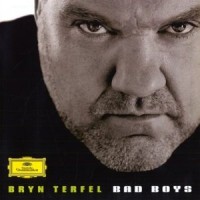Packaged with a peek-a-boo cover exposing only Bryn Terfel’s lovely left eye (the effect of turning the page to reveal the Welsh bass-baritone’s head in its entirety brings to mind this Encyclopedia Dramatica entry) and an oddly hip-hop-flavored gray-on-black treatment of the album’s title, Terfel’s Bad Boys
seems designed for those who like their divos naughty.
Bad Boys is a collection of familiar bass and baritone arias from the standard repertory, loosely themed around the fact that most of the characters presented are what the liner notes rather redundantly describe as “some of the most unscrupulous, cynical, devious, roguish figures of the opera stage.” Most of the men portrayed are indeed unambiguously villainous (both Boito and Faust’s versions of Mephistopheles, Verdi’s Jago, Scarpia, Pizarro), although the Commendatore of Don Giovanni has always seemed like a pretty upstanding guy to me.
Terfel, who recorded the album last year with the Swedish Radio Symphony Orchestra under the baton of Paul Daniel, is in excellent voice throughout the album, though he seems to have some trouble choosing appropriate material. The disc has several highlights, most of which come when Terfel engages dramatically with the more complex villains. He puts over Gounod’s “Song of the Golden Calf” with the concealed desperation of a seemingly cocky used-car salesman who knows his customer is considering walking off the lot empty-handed.
His chilling’y triumphant performance of Kaspar’s aria “Schweig, schweig! damit dich niemand wart” from Der Freischütz, agilely bringing out contrasting emotional colors in the music to suggest the fascinating instability of a psychopath. His recording of Jago’s manifesto (“Credo in un Dio crude”) from Verdi’s Otello reveals the exhausting depths of the character’s love/hate obsession with Otello, who is never mentioned in the aria but who Terfel’s interpretation made me realize was lurking behind every word.
For Scarpia’s “Te Deum” aria from Tosca, Terfel chooses an unusually straightforward and brightly heroic tone, which provides a perverse contrast that only makes dramaturgical sense if one believes Scarpia sees himself as a good man; not my interpretation, but it’s certainly interesting to hear the aria with a different tone than the more common openly lecherous take.
Terfel’s voice is a little heavy, to my taste, to handle two lighter comic villains, Don Basilio from Il barbiere di Siviglia and Dulcamara from L’elisir a’amore; his strength is in tormented, psychologically layered characters, and his instrument seems less suited to more delicate comedic roles.
The disc is unusually heavy on crossover material, including a more-idiomatic-than-you’d-think rendition of “It Ain’t Necessarily So” from Porgy and Bess and an awkward attempt at the title character’s “Epiphany” in Sweeney Todd that Terfel simply doesn’t have the lyrical flexibility to pull off effectively. Terfel’s version of Gilbert and Sullivan’s wonderful “When The Night Wind Howls” from Ruddigore should answer the probably-never-asked question of if Terfel should chuck his international career to focus on operetta (answer: Gehenna no!) but his surprisingly sunny and comfortable performance of the mischievous “Moritat” from Brecht/Weill’s Threepenny Opera suggests he could be effective in the right musical theater repertory.
The disc’s low point is the Alain Boublil/Claude-Michel Schönberg composition “Stars,” a prefabricated showstopper from their wildly successful stage adaptation of Les Miserables. Deploying Terfel’s instrument on such a predictable composition only serves to expose how cheaply constructed the song is; the effect of listening to it is a bit like hearing the New York Philharmonic play “Mary Had a Little Lamb” – of course, it sounds fine, but you really wish they’d chosen to expend all that effort on something more interesting.
As a strange finale that should earn Terfel recognition even in the perennially crowded field of candidates for Most Self-Indulgent Act By An Opera Star, Male Division, he records the final Commendatore/Leporello/Don Giovanni trio from Mozart’s Don Giovanni as a trio with himself (and himself). He chooses distinct voices for each of the men (with some assistance from a sound designer, particularly in the case of the ghost of the Commendatore, who sounds like he’s chastising the promiscuous Don from the bottom of a well) and the final recording is actually much more musically and dramatically effective than you’d have every right to expect.
Ultimately, Bad Boys is a bit like Mae West: when it’s good, it’s good, and when it’s bad, it’s better.



